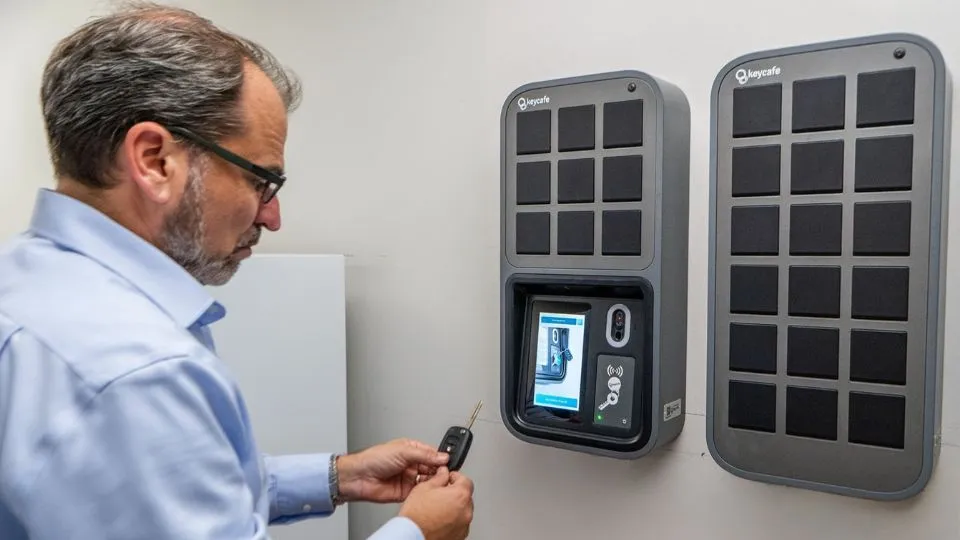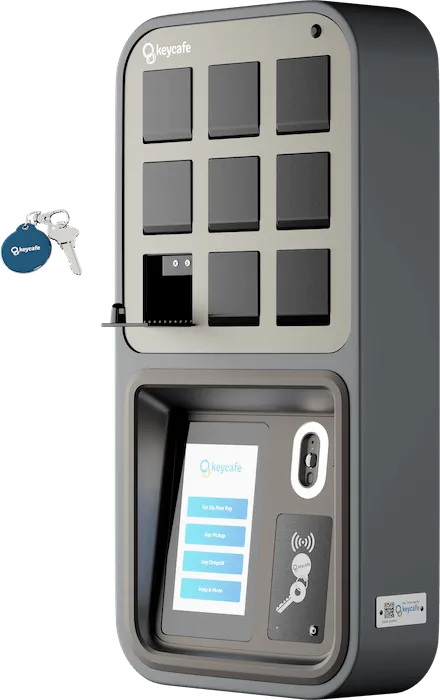0 minutes
Written by
Nicole Arasaki
Published on
November 19, 0205
Published on
November 19, 0205
Modified on
November 21, 2025
Go Back


Every dealership leader has felt the impact of poor key control. A few missing fobs, extra minutes spent searching, or a delayed test drive can add real cost to a store over the course of a year. In fact, an industry report noted that some dealers replace five keys per month at roughly $350 each, adding up to more than $20,000 annually in preventable expense. Despite this, many operations still rely on pegboards, binders, or mechanical cabinets that make it hard to see where time and money are being lost.
Smart key management changes that. With a real-time view of key activity across sales, service, detail, and management, dealerships can finally measure the issues that were once hidden. Waste becomes visible, lost time is easier to recover, and replacement costs start to drop. Once everything is tracked and organized, the financial return becomes clear.
Most managers can point to a missing fob or a stalled test drive, but the steady financial drain behind those moments is harder to spot without real data. Traditional key systems contribute to that problem in a few predictable ways.
Replacing modern keys is expensive, often costing several hundred dollars. When a store loses even a small number each year, the total adds up quickly and often without a clear understanding of how it happened.
Staff time slips away in small pieces. A salesperson walks the lot looking for a vehicle, a technician waits for a key to turn up, or a manager steps in to figure out who last used a car. These interruptions seem minor at the moment, but they build into real operational cost.
Customer flow slows down as well. A test drive gets pushed back, a service pickup takes longer, or a vehicle can’t move into a bay. These delays create friction that customers notice.
Because there’s no clear record of key activity, the same issues continue to surface, and no one can trace the cause. This is exactly where smart key management begins to show its value.
The return starts with one shift: keys move from an unmonitored setup to a controlled one. When every pickup, return, and handoff is logged, waste and risk drop.
The first change is the drop in missing keys. With each key in its own locked compartment and access tied to a user, replacement costs fall fast. Many dealerships that replace several keys each month report that the problem stops entirely.
Labor savings come next. Staff no longer walk between departments asking about keys or searching for vehicles. A task that once took minutes now takes seconds.
Vehicles also move through the workflow more quickly. Sales teams cut delays during test drives. Service technicians pull cars into bays without waiting. Detail teams return vehicles to the lot sooner. With each stage moving faster, both sales and service see higher throughput, which leads to stronger revenue.
James Wolfram from Al Packer Ford explained the financial impact in straightforward terms:
“There has definitely been a return on our investment… Before Keycafe, our spend was upwards of about $8,000 or $9,000 to remake keys. These smart keys are $400 or $500 a piece to remake. And the amount of keys that we’re not losing now has far outweighed the amount of money we’re spending on Keycafe for our yearly spend and the initial startup costs.”
Their experience highlights a pattern many dealerships recognize. Key loss often goes unnoticed as a recurring expense, and the totals become significant over time. Once a smart system is in place and those losses disappear, the financial return becomes easy to measure.
Each category creates value on its own, but the combined effect is what makes the system stand out. Dealerships often describe the financial return not as one large gain, but as a steady reduction in avoidable problems that once drained time and money.
Dealerships often underestimate the true cost of disorganized key control. A simple review of four categories reveals the financial impact:
When these numbers are added together, the cost of not having a smart system becomes clear.
Most dealerships see immediate operational gains. Keys become easy to find, staff adopt the system quickly, and internal communication improves. Over the first few months, key loss issues usually disappear, labor time becomes easier to control, and managers experience fewer workflow interruptions.
Financial gains follow soon after. Stores that replaced keys frequently see the clearest early return, while others gain the most from time savings and stronger accountability. In most cases, dealerships achieve full ROI within the first year, and many reach that point much earlier.
Smart key management gives dealerships a practical way to cut waste, protect valuable assets, and support steady workflow across all departments. The return on investment appears through fewer lost keys, recovered time, and smoother customer movement. For leaders focused on margins, throughput, and long-term cost control, it becomes a straightforward operational upgrade with measurable financial benefits.
If your dealership is still replacing keys, losing time between departments, or resolving preventable customer delays, now is the right moment to evaluate how much financial return a smart system can deliver.
Request a demo to see how a modern key management system can start producing ROI in your dealership.
